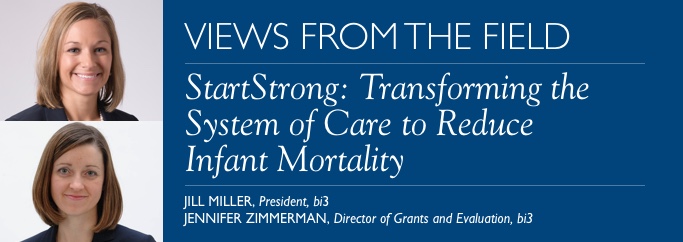
Infant mortality represents a long-standing public health concern.
It is a dichotomy to think that the United States, with the sophisticated medical care available here, has higher infant mortality rates than most other developed countries. A higher rate of premature births in the United States is the main reason for this poor ranking.
For years, Cincinnati’s Avondale neighborhood recorded some of the highest infant mortality and preterm birth rates in the country. Now, after intense intervention, it has been nearly three years since Avondale had a single extreme preterm (before 28 weeks gestation) birth. Avondale progressed from having one of the highest infant mortality rates in Cincinnati to one of the lowest—a striking accomplishment.
Disrupting the Current System of Care
In 2013, bi3, Bethesda Inc.’s grantmaking initiative, requested proposals seeking new ideas with the potential to lead to breakthrough change in health and health care delivery. Cincinnati Children’s Hospital Medical Center and a community-based home visitation agency submitted separate proposals focused on reducing infant mortality. bi3 saw a funding opportunity to pair unlikely partners to design a disruptive new model of care and improve outcomes for moms and babes, beginning in the neighborhood of Avondale. This effort became known as StartStrong.
Fostering Collaboration
Fundamental to the project’s success were steps taken to ensure a common understanding and goal set essential to foster collaboration. The partners recognized that the existing health care model was less a system and more a collection of unconnected services. Each partner had to understand they were elements in a larger ecosystem that needed to be optimized.
A shared vision was shaped based on listening to patients. The team envisioned a new model of care that placed mothers (rather than providers) at the center and surrounded them with integrated health and social supports to address barriers that deter healthy pregnancies and births.
Metrics were purposely chosen that required breaking down silos and collaborating to reach common goals. Partners agreed to share their data and discuss successes and failures. This approach built trust and facilitated collaboration across organizations who were traditional competitors.
Strong leadership and good communication were critically important. The StartStrong team worked to gain full buy-in from health system senior executives, including a commitment to dedicate staff resources. Timely engagement of hospital senior leaders was key to remove barriers to improvement. Leaders were willing to have hard conversations and address challenges when they arose.
Increased Patient and Community Engagement
The StartStrong team began its field work by listening. They actively held conversations with women, families, and the Avondale community to understand what prevented women from getting prenatal care and becoming connected to needed social supports.
Through community engagement strategies such as hosting community meals for health care providers and families and working with churches to deliver messages about the importance of early prenatal care, providers built rapport with expectant mothers. Focusing on the needs women shared built trust and informed the redesign of the care system to offer new solutions moms valued.
Improved System of Care
Strategies and interventions were revised regularly based on weekly testing and learning. These refinements meant that as the care model evolved, so did the understanding and ability of the partners to deliver services that were useful, accessible and important to moms.
StartStrong’s Bundle of Care included early obstetrical clinical care for every mom; supportive communities to engage and activate mothers; coordinated, place-based care; and timely social services addressing issues that undermine health.
StartStrong enlisted a team-based approach to deliver the bundle of care that included a nurse case manager, a home visitor, a community health worker, and the obstetrician. The care team also expanded to include community-based resources such as newly formed parent groups, a pantry with baby supplies, and churches.
To spread the model and speed physician and community engagement, project leaders formed a Learning Collaborative. The collaborative united 20 obstetric teams and eight community teams through common measures, data sharing and an “all teach, all learn” philosophy. Teams received training and on-site coaching based upon quality improvement science. They came together through large group learning sessions and monthly webinars. In calendar year 2016, over 2,000 new patients received interventions stemming from the Collaborative. Today, over 90 percent of providers to Medicaid mothers living in Hamilton County (Cincinnati) participate in the learning collaborative.
Shared Learning to Benefit Others
StartStrong’s progress and results have attracted nearly $2 million in new Medicaid funding to deploy more community health workers in Cincinnati.
The project has changed clinic, community, and family care systems based on three key enablers: developing of trusting relationships, connection to needed clinic and community care, and mitigation of social barriers. These enablers are now embodied in emergent initiatives to spread the work of StartStrong to other neighborhoods.
A toolkit based on StartStrong learnings is being developed to provide guidance for other communities and/or organizations which recognize systems and relationships must change in order to improve maternal and infant health. The toolkit will allow others to move forward more quickly by applying learnings, challenges and successes of StartStrong.
Bi3 was a thought partner throughout the life of the grant. We supported the StartStrong team through our willingness to:
- invest based on informed risks,
- value learning and continuous improvement as much as outcomes,
- provide flexibility in the grant budget to adapt to changes and learnings along the way, and
- instill confidence when the team faced challenges.
Indeed, this was borne out through feedback from a funded partner:
“The support and partnership of bi3 to test new directions with the agreement that failure is a possible outcome has truly allowed us to learn. We know that bi3 is unique in this way. It has been important that bi3 has been a true partner as (we) have navigated the preterm birth and infant mortality community health space. bi3 has been insightful and patient as we have figured out how to collaborate internally and with community partners with the health of pregnant women and newborns driving us.”
For more information about the StartStrong project, please visit bi3.org/reports.

